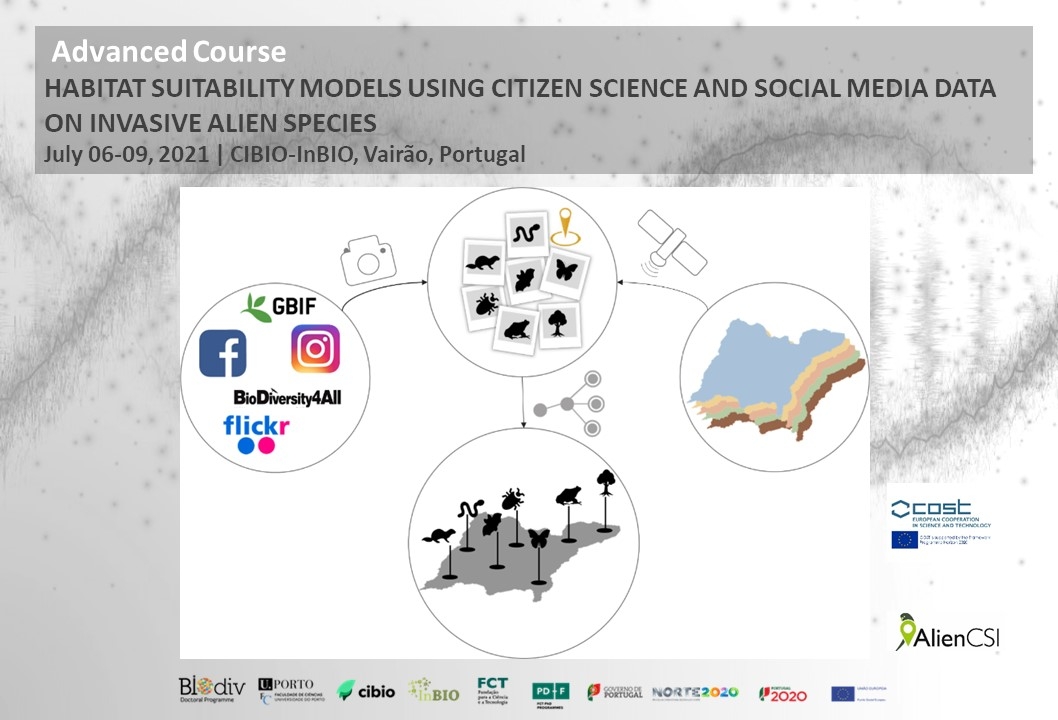Habitat Suitability Models using citizen science and social media data on invasive alien species

With the rapid expansion of invasive alien species, accurate and timely distribution data is critical to support successful management strategies. However, it is not easy for researchers (technicians) to obtain data for all invasive alien species and territories. In this context, data collected by citizens can be a useful tool, complementing research data to calibrate Habitat Distribution Models (HDMs) and therefore optimize surveillance efforts. These models can guide future surveillance efforts for society in general, managers, decision-makers and researchers.
The skills that will be provided by this course are:
• Theoretical basis of invasion ecology;
• Introduction to Habitat distribution models (both single species and species assemblages)
• Basics of social media analytics;
• General approaches to handle citizen-science data;
• Basic procedures in R software and statistical programming;
• General application of R modelling packages biomod2 and SESAM
• Spatial analyses of ecological and environmental data.
The official language of the course will be English. The course is developed for students and researchers at early stage of their career. Atendees are not expected to have advanced experience with programming and statistics but should be interested in getting a broader view of modelling options. No previous knowledge about R is required.
Participants should preferably use their own laptops for the course and will be asked to install R software in their laptops prior to the course. The necessary instructions to perform this task will send by email one week prior to the start of the course.
A document with an extended summary of the lessons contents and bibliography will be delivered by email to the students one week prior to the start of the course.
PROGRAMME
Day 1
Morning:
Welcome message
OPEN LECTURE - Alien invasive species: patterns, processes, and impacts (by João Honrado)
OPEN LECTURE – Citizen science in invasion ecology (by Helen Roy)
Break
OPEN LECTURE – Citizen science in Portugal: from Invasoras.pt to Biodiversity4All (by Elizabete Marchante)
Lunch
Afternoon:
PRACTICALS (PART I) – Obtaining useful data through citizen science platforms (by Elizabete Marchante)
Break
OPEN LECTURE – Alien invasive species and social media (by Ana Sofia Vaz)
PRACTICALS (PART II) – Setting the scene: gathering social media and citizen science data to support modelling procedures (by Ana Sofia Vaz & Joana Vicente)
Day 2
Morning:
OPEN LECTURE – Habitat Distribution Models (single-species) - biomod2 R package (by Joana Vicente)
Break
OPEN LECTURE – Habitat Distribution Models (multi-species) - SESAM R package (by Adrián Regos)
Lunch
Afternoon:
PRACTICALS (PART I) – biomod2 –Spatial modelling of ecological niches of single alien invader species using citizen data (by Joana Vicente & João Gonçalves)
Break
PRACTICALS (PART II) – biomod2 –Spatial modelling of ecological niches of single alien invader species using citizen data (by Joana Vicente & João Gonçalves)
Day 3
Morning:
PRACTICALS (PART I) – SESAM –Spatial modelling of ecological niches of single alien invader species using citizen data (Adrián Regos & Joana Vicente)
Break
PRACTICALS (PART II) – SESAM –Spatial modelling of ecological niches of single alien invader species using citizen data (Adrián Regos & Joana Vicente)
Lunch
Afternoon:
PRACTICALS (PART I) – Working with your own data (by all instructors)
Break
PRACTICALS (PART II) – Working with your own data (by all instructors)
Closing session
Day 4 OPEN DAY
Morning:
LECTURE I - Detecting and accounting for biases in large ecological datasets (by Bernd Lenzner)
LECTURE II - Creating workflows to process, standardise and integrate citizen science data (by Hanno Seebens)
LECTURE III - How to include non-professional taxonomic experts in the scientific process (by Lien Reyserhove)
Break
LECTURE IV – Engaging Citizen Scientists into spotting, reporting and understanding aquatic Alien Species (by Elena Tricarico)
LECTURE V – New technologies for new research with citizen scientists (by Tim Adriaens)
LECTURE VI – Extracting information from the noise of social media (by Tom August)
Lunch
Afternoon:
LECTURE VII – What can you get out of a BioBlitz? (by Quentin Groom and followed by an introduction to the practical session…)
PRACTICALS - Designing a project to understand and monitor invasive species through citizen science (by the Alien CSI team)
Schedule: 4 days between 9:45am and 17:45pm / 24 Hours
COURSE INSTRUCTORS
Joana Vicente | CIBIO/INBIO | ECOCHANGE
Ana Sofia Vaz | CIBIO/INBIO | ECOCHANGE
Helen Roy | NERC - UK Centre for Ecology & Hydrology
João Honrado | CIBIO/INBIO | ECOCHANGE
OTHERS INSTRUCTORS
João Gonçalves | CIBIO/INBIO | ECOCHANGE
Adrián Regos | CIBIO/INBIO | ECOCHANGE
Elizabete Marchante | Centre for Functional Ecology - Science for People & the Planet – U. Coimbra
INTENDED AUDIENCE
The course will be open to a maximum number of 15 participants.
SELECTION CRITERIA
75% of available student slots are reserved for BIODIV students.
Priority will be given to:
• 1st year and other PhD students attending the BIODIV Doctoral Program;
• PhD students attending other courses;
• Other post-graduate students and researchers.
REGISTRATION
Participation is free of charge for BIODIV students | 80€ (students) | 150€ (other participants). CIBIO-InBIO members will have an additional discount of 20%.
To apply, please fill the form available HERE
Registration deadline: May 27, 2021
All applicants will be notify about whether they are accept until June 07, 2021
Please note that new rules apply for all BIODIV students.
